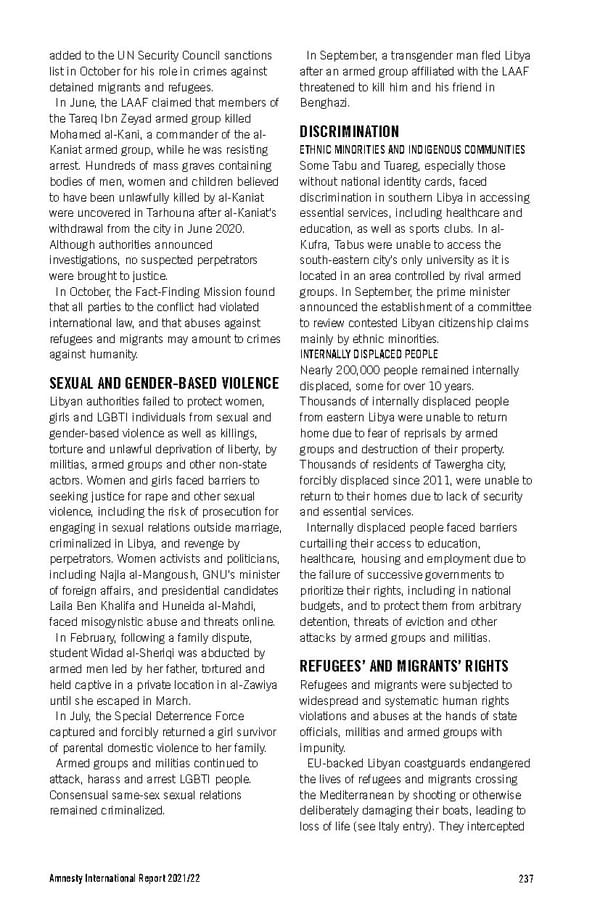added to the UN Security Council sanctions In September, a transgender man fled Libya list in October for his role in crimes against after an armed group affiliated with the LAAF detained migrants and refugees. threatened to kill him and his friend in In June, the LAAF claimed that members of Benghazi. the Tareq Ibn Zeyad armed group killed DISCRIMINATION Mohamed al-Kani, a commander of the al- Kaniat armed group, while he was resisting ETHNIC MINORITIES AND INDIGENOUS COMMUNITIES arrest. Hundreds of mass graves containing Some Tabu and Tuareg, especially those bodies of men, women and children believed without national identity cards, faced to have been unlawfully killed by al-Kaniat discrimination in southern Libya in accessing were uncovered in Tarhouna after al-Kaniat’s essential services, including healthcare and withdrawal from the city in June 2020. education, as well as sports clubs. In al- Although authorities announced Kufra, Tabus were unable to access the investigations, no suspected perpetrators south-eastern city’s only university as it is were brought to justice. located in an area controlled by rival armed In October, the Fact-Finding Mission found groups. In September, the prime minister that all parties to the conflict had violated announced the establishment of a committee international law, and that abuses against to review contested Libyan citizenship claims refugees and migrants may amount to crimes mainly by ethnic minorities. against humanity. INTERNALLY DISPLACED PEOPLE SEXUAL AND GENDER-BASED VIOLENCE Nearly 200,000 people remained internally displaced, some for over 10 years. Libyan authorities failed to protect women, Thousands of internally displaced people girls and LGBTI individuals from sexual and from eastern Libya were unable to return gender-based violence as well as killings, home due to fear of reprisals by armed torture and unlawful deprivation of liberty, by groups and destruction of their property. militias, armed groups and other non-state Thousands of residents of Tawergha city, actors. Women and girls faced barriers to forcibly displaced since 2011, were unable to seeking justice for rape and other sexual return to their homes due to lack of security violence, including the risk of prosecution for and essential services. engaging in sexual relations outside marriage, Internally displaced people faced barriers criminalized in Libya, and revenge by curtailing their access to education, perpetrators. Women activists and politicians, healthcare, housing and employment due to including Najla al-Mangoush, GNU’s minister the failure of successive governments to of foreign affairs, and presidential candidates prioritize their rights, including in national Laila Ben Khalifa and Huneida al-Mahdi, budgets, and to protect them from arbitrary faced misogynistic abuse and threats online. detention, threats of eviction and other In February, following a family dispute, attacks by armed groups and militias. student Widad al-Sheriqi was abducted by armed men led by her father, tortured and REFUGEES’ AND MIGRANTS’ RIGHTS held captive in a private location in al-Zawiya Refugees and migrants were subjected to until she escaped in March. widespread and systematic human rights In July, the Special Deterrence Force violations and abuses at the hands of state captured and forcibly returned a girl survivor officials, militias and armed groups with of parental domestic violence to her family. impunity. Armed groups and militias continued to EU-backed Libyan coastguards endangered attack, harass and arrest LGBTI people. the lives of refugees and migrants crossing Consensual same-sex sexual relations the Mediterranean by shooting or otherwise remained criminalized. deliberately damaging their boats, leading to loss of life (see Italy entry). They intercepted Amnesty International Report 2021/22 237
 Amnesty International Report 2021/22 Page 236 Page 238
Amnesty International Report 2021/22 Page 236 Page 238